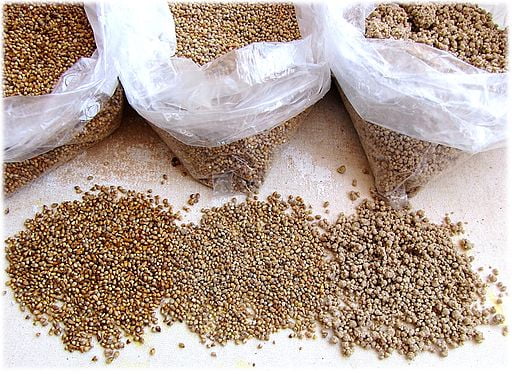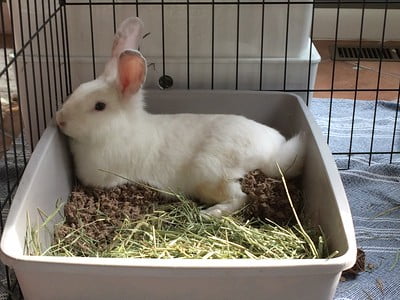Last Updated on March 8, 2023 by Marjon Ramos
Nuts should never be fed to rabbits intentionally because they’re too high in fat.
Also, some nuts are potentially poisonous to rabbits, like almonds and peanuts.
Almonds belong to plants that are noted for their cyanide-producing potential.
Peanuts, on the other hand, carry the risk of aflatoxin poisoning.
A rabbit’s diet should mainly focus on fiber, while fat should be limited to 3%.
Feeding your rabbits excessive amounts of fatty food could lead to all kinds of health problems like GI stasis, diarrhea, fatty liver disease, and obesity because rabbits don’t tolerate fatty foods well.
If you notice any changes in your rabbit’s stool, both in size and consistency, or any signs of poisoning after accidentally eating nuts, immediately bring your rabbit to a veterinarian.
Now that I’ve given you the gist of the article, read on as I explain in more detail why rabbits can’t eat nuts:
Table of Contents
Risk of overfeeding nuts to rabbits.
Fatty and starchy foods like nuts should not be fed to rabbits intentionally.
They carry certain risks when fed in large amounts.
Rabbits’ digestive systems are not really designed to digest large amounts of food like nuts.
Here are some of the risks associated with feeding your rabbits large amounts of nuts :
Poisoning
Some nuts, like almonds and peanuts, are potentially poisonous to rabbits, feeding them large amounts of nuts could lead to intoxication.
Here are the most common symptoms of cyanide intoxication in rabbits after eating almonds:
- Seizures
- Digestive signs of intestinal inflammation
- Loss of body temperature regulation – high or low
- Lethargy, listlessness
- Loss of appetite
- Depression
Here are the most common symptoms of aflatoxin poisoning in rabbits from eating peanuts:
- Diarrhea
- Anorexia
- Jaundice
- Loss of appetite
- Reduced weight gains
- High mortality
- Depression
If you notice or suspect that your rabbit might be suffering from cyanide or aflatoxin poisoning, immediately call your veterinarian or the animal poison control hotline.
Fatty liver disease
Most nuts are high in fat, feeding your rabbits nuts long-term could lead to hepatic lipidosis, or fatty liver disease.
A rabbit’s diet should consist of less than 3% fat.
Here are the signs that your rabbit might be suffering from fatty liver disease caused by excess fat:
- Loss of appetite (anorexia) – may be sudden or gradual.
- Weight loss
- Decline in number and size of droppings (feces)
- Dehydration
- Depression and lethargy
Diarrhea
Diarrhea in rabbits is often caused by the wrong diet or when the diet is changed too fast.
Feeding your rabbit large amounts of nuts would check those two boxes I mentioned.
Gastrointestinal Stasis
Gastrointestinal stasis is also possible when a rabbit is fed large amounts of nuts, which are high in fat.
GI stasis mainly happens when a rabbit is fed a low-fiber diet.
GI stasis happens when the balance of bacteria in your rabbit’s gut is disrupted.
This disruption would cause painful gas that would eventually lead to organ failure and death if not treated immediately.
The signs of GI stasis are:
- Depressed
- Hunched posture
- Bruxism
- Decreased appetite/anorexia
If you notice any of these signs, immediately bring your rabbit to a veterinarian.
Uneaten cecotropes
Soft uneaten cecotropes are also possible when rabbits are eating large amounts of nuts instead of hay.
This could lead to softer cecotropes due to the lack of fiber in your rabbit’s diet.
Obesity
Obesity in rabbits is also possible when fed large amounts of starchy food.
Rabbits that are confined in cages all day without exercise and fed large amounts of high-carb, low-fiber diets are the most susceptible to obesity.
Healthy alternative to nuts as treats.
If you are planning on giving your rabbits nuts as treats, these alternatives are much healthier.
Here are some alternatives that you can give to your rabbits one to two times per week as a treat:
- Melon
- Nectarine
- Apple (remove seeds)
- Banana
- Papaya
- Peach
- Blueberries
- Blackberries
- Pear
- Strawberries
- Raspberries
- Cranberries
- Pineapple
- Plum
- Watermelon
- Cherries (remove seeds)
- Grapes
- Orange
FAQ (Frequently Asked Questions)
Should you panic if your rabbit eats a little bit of nuts?
While nuts are not recommended for rabbits, most of them are still not toxic.
It’s just that nuts are too high in fat, sugar, and starch, all of which are not digested well by rabbits.
If you are worried, just feed them a lot of hay.
The extra fiber would likely fix the problem on its own.
If you’re worried about cyanide or aflatoxin poisoning, just observe your rabbit for any additional symptoms.
Be on the look out for seizures, depression, loss of appetite, diarrhea, jaundice, lethargy, high or low body temperature, and signs of digestive inflammation.
You can also call the poison control hotline if you suspect or are worried that your rabbit is experiencing intoxication.
What to do if your rabbit ate nuts?
Observe your rabbit’s behavior and poop for any changes.
You should also feed them a lot of hay.
The extra fiber would help balance their gut flora.
If you notice any changes in their poop or behavior, consult a veterinarian immediately.
Conclusion
Nuts should never be fed to rabbits intentionally.
They could cause cyanide (almonds) or aflatoxin (peanuts) poisoning in rabbits.
Nuts are also high in fat and starch, which could lead to digestive problems in large amounts.
If you suspect or are worried that your rabbit might be suffering from cyanide or aflatoxin poisoning, call your veterinarian or the animal poison control hotline.
Cite this article:
Sources
- Patry, Karen, et al. The Rabbit-Raising Problem Solver: Your Questions Answered about Housing, Feeding, Behavior, Health Care, Breeding, and Kindling. Storey Publishing, 2014.
Image credit – “Pistachios, almonds, cashews, walnuts, pine nuts and hazelnuts on a black background” by Marco Verch Professional Photograph




